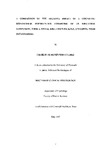A COMPARISON OF THE RELATIVE IMPACT OF A COGNITIVE-BEHAVIOURAL INTERVENTION CONSISTING OF AN EDUCATION COMPONENT, WITH A POSTAL EDUCATION PACKAGE, ON COPING WITH OSTEOPOROSIS
| dc.contributor.author | DAVENPORT CLARKE, CHARLOTTE | |
| dc.contributor.other | School of Psychology | en_US |
| dc.date.accessioned | 2013-10-21T11:43:00Z | |
| dc.date.available | 2013-10-21T11:43:00Z | |
| dc.date.issued | 1997 | |
| dc.identifier | NOT AVAILABLE | en_US |
| dc.identifier.uri | http://hdl.handle.net/10026.1/2256 | |
| dc.description.abstract |
A study was carried out in order to compare the effects of a cognitive-behavioural intervention, with a postal education package, on coping with osteoporosis. Thirty osteoporosis sufferers were divided into three groups. One group received an intervention programme consisting of education, relaxation techniques, and instruction in the use of coping strategies for pain and stress. A comparison group received an education booklet on osteoporosis sent to them through the postal system. The study also included a non-treatment control group. Measures of locus of control, depression, anxiety, pain, and disease knowledge, were taken pre-and post-intervention. lt was predicted that the intervention group would report a significant decrease in external locus of control (subdivided into chance happenings, and powerful doctor control beliefs), and an increase in internal locus of control, and in disease knowledge compared to the other two groups. A significant decrease in depression, anxiety, and pain ratings was also predicted for the intervention group compared to the comparison group and the control group. It was further predicted that their would be no relationship between the age of participants, and scores on any of the outcome measures. Analyses of variance carried out on the data revealed significant differences between the groups from baseline to follow-up on some of the measures. Depression and pain ratings decreased significantly for the intervention group compared to the other two groups. Although anxiety also showed a trend to decrease for the intervention group, this result was not significant. Both internal locus of control and disease knowledge increased significantly for the intervention group compared to the other two groups. No significant differences were found post-intervention between the groups for external locus of control. Correlational analysis revealed no significant relationship between the age of participants and any of the dependent measures. These results suggest that education delivered on an individual basis as part of a cognitive behavioural-intervention is more effective in increasing disease knowledge than an education package sent to osteoporosis sufferers through the postal system. The results further suggest that adaptation to osteoporosis can be facilitated by equipping sufferers with a repertoire of cognitive-behavioural coping strategies, and that older adults are just as likely to benefit from such an approach as their younger counterparts. The results are discussed in relation to previous research findings, and suggestions for future research are put forward. | en_US |
| dc.description.sponsorship | Cornwall Healthcare Trust | en_US |
| dc.language.iso | en | en_US |
| dc.publisher | University of Plymouth | en_US |
| dc.title | A COMPARISON OF THE RELATIVE IMPACT OF A COGNITIVE-BEHAVIOURAL INTERVENTION CONSISTING OF AN EDUCATION COMPONENT, WITH A POSTAL EDUCATION PACKAGE, ON COPING WITH OSTEOPOROSIS | en_US |
| dc.type | Thesis | |
| dc.identifier.doi | http://dx.doi.org/10.24382/3886 | |
| dc.identifier.doi | http://dx.doi.org/10.24382/3886 |
Files in this item
This item appears in the following Collection(s)
-
01 Research Theses Main Collection
Research Theses Main


